
The documentary highlights the special challenges facing disabled female veterans as they transition from active duty to civilian life.
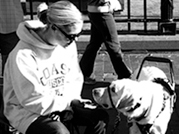

The documentary highlights the special challenges facing disabled female veterans as they transition from active duty to civilian life.

SERVICE wins NY Emmy Award for Best Military Program!
Streaming rental: Click Here
This inspiring documentary is about women warriors in their most fierce and intimate battle to overcome visible and invisible wounds ... a must see!" Alfie Alvarado-Ramos, Director, Washington State VA
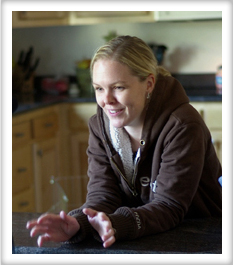
SA (ret.) Alexis Courneen (USCG): I served in the US Coast Guard and was stationed in NYC. I am technically a Persian Gulf Veteran due to my dates of service. I was matched with Sooner, a yellow Lab, on March 1, 2009, through NEADS and the Canines for Combat Veterans Program. Due to blunt trauma, I have crushed the nerves in my right (dominate) arm/elbow, fractured hip, cervical arthritis, TBI from slamming my head on steel deck of my boat. The docs say at the VA that these injuries opened Pandora's box with my body because I am battling the effects of an autoimmune disease which affects my balance, excessive fatigue, extreme pain, mobility issues and so on. Sooner has been a Godsend to not only me, but my family as well. I have 2 little girls (ages 4 and 6) who have been able to have peace of mind that mommy will be OK when they are at school because Sooner can get the phone for me if and when I fall so I can call for help. He assists me in laundry, fetching items off the ground, stability in walking both at home and out in the big world. My husband says he has seen such a change in me since getting Sooner. The calming effect he has in me is vital in stressful situations. With also dealing with PTSD issues, he is there showing me I am not alone. His patience is such a gift. He has become one of the family and given us a gift of hope that was not there before. Priceless!

CPL (ret.) Sue Downes (USA): I served in Afghanistan and was originally stationed in Germany. In Feb 2005, I was deployed with the 554th Military Police Co. attached to the 10th Mt. Division out of New York. In Afghanistan, I was stationed in Logar Province, where we had only about 50 personnel. I was a gunner and also a driver. After returning back from R&R in November 2005, I was asked if I wanted to be a gunner for a mission the next day. About 30 min. into the mission, we hit 3 landmines that were pressure plated, so when our Humvee tires hit, they exploded throwing my driver from the truck and instantly killing my squad leader. The driver bled out within 3 mins. I eventually regained consciousness.
I remember nothing of that day, other than the snow and the mountains. All I know is what I have been told. I suffered leg amputations both below knee, a liver laceration, an intestine laceration, left arm nerve damage, and also TBI and PTSD. While at Walter Reed, I was encouraged to apply for a service dog through the NEADSs (National Education for Assistance Dog Services) Canines for Combat Veterans program. In August 2007, I was paired with Lila -- a yellow Labrador, and we both quickly became known as "blonde on blonde" by other patients.
In addition to helping me walk with my prosthetic legs, Lila has become a loving and intuitive companion, particularly with PTSD: "The big thing is, she helps me with a lot of stress issues, which I didn't expect her to do. If I'm down in the dumps one day, she knows. She'll come lay at my feet or jump up on the couch. She's not supposed to, but I let her. She lies beside me and tries to cheer me up."
I am the first female combat veteran to receive a service dog. Now retired from the Army, I feel that I have adjusted "pretty well," with good days and bad. I tire easily and do not go out as much as I used to. However, on a good day, Lila and I might visit the local veterans association or shop for groceries; Lila also likes to go to PetSmart. I am thankful that while out in public, people tend to pay more attention to Lila than to my disabilities. She helps with a lot of things: picking up things when I drop them, bring me things when I point to them, opens doors, makes me smile when I don't feel like it.
I have overcome a lot. Lila makes me feel at ease. In the Army, we have this thing called a "battle buddy." You never go anywhere by yourself, and you always take your "battle buddy" because they are there to protect you and you are there to protect them. It's the same concept with a service dog."

Mariette Katharine Kalinowski: I enlisted the Marine Corps Reserves in 2002, and graduated from boot camp in 2003. I was first deployed to Al Taqaddum, Iraq in August 2005 with Combat Logistics Regiment 25, and was attached to 2nd MP Battalion, "A" Company, and served in the role of convoy security. It was during this tour that I witnessed several events that endangered or killed Marines and Iraqi nationals. These events affected me in such a way that I developed PTSD. Since my first tour, my struggles with PTSD have complicated various aspects of my life and I still have not completely adjusted to normal life. I deployed a second time to Al Taqaddum in August 2008 with Combat Logistics Regiment 15, where I served as the Noncommissioned Officer in Charge of a Class IX supply yard. My section was responsible for a large percentage of the repair and replacement parts necessary to maintain Marine operations throughout western Al Anbar Province. During this tour, I rarely left base, and so experience more of the emotional strain of a deployment through the daily stress of my job, and my separation from home and loved ones. While not as physically traumatic as my first tour, my second tour reinforced many of the issues of my PTSD. I now actively seek mental counseling from the VA for my PTSD, and am exploring a possible case of TBI, as a result of an experience in my first tour. I am currently a senior at Hunter College, seeking a Bachelor of Arts in Critical Literature, and hope to continue on to study an MFA in creative writing. Fiction writing proved to be a tremendous personal aide following my service in the Marine Corps, helping to alleviate many of the emotional pressures that I would otherwise be unable to communicate. I also give back to the veterans' community in my job with the Project for Returning Opportunities in Veterans Education, or PROVE, where I serve as a student veteran mentor. I specialize in aiding fellow veterans during their transition into higher education and into civilian life.
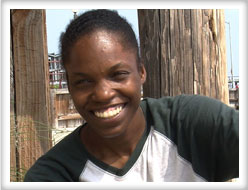
Lashonna Perry was a Quartermaster Chemical Equipment Specialist in the US Army. She was deployed to Afghanistan in 2003 and served with the 210FSB Forward Battalion, out of Fort Drum, as an armor and maintenance mechanic. She also served as a member of a security patrol protecting local civilians. In 2004, she was deployed to Iraq where she worked as a generator mechanic and then a radio transmission operator for her first sergeant and commander. She left the army in 2006.
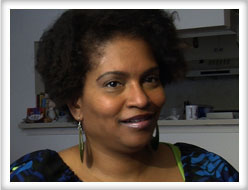
BriGette McCoy I served in the US Army from 1987 to 1991 and became an E4, communications specialist with top secret clearance. Since leaving the service I've had a variety of jobs including medical claims processor, insurance underwriter, bank card specialist and mortgage originator. I suffer from a back injury incurred while in the army and from the hidden disability of MST that got so out of control I lost my job and my house and ended up homeless with two children. I couldn't get help until I understood what was wrong and that didn't happen until I found the website VETS WOW. Through the women vets I met on line, I learned about MST and PTSD and with their support, I was able to seek help at the VA.

SPC Alicia Thompson (ret.) I served in Afghanistan with Sue Downes, In February 2006 I was deployed with the 554th Military Police Company, and attached to the 10th Mountain Division out of Fort Drumm, New York. My forward operating base was in Logar province with about 50 other personnel. During my time there I was part of different types of missions from security, patrolling, humanitarian aid, and military intelligence collection. During that year I made friends with people that are now family to me, and I hold them very near and dear to my heart. Sue has become more than a sister to me and her story is an inspiration to me every day of my life.
Because of things that happened while I was deployed, I now live with PTSD (Post Traumatic Stress Disorder) which is a constant struggle for me every day. It is a reminder of the life I lived, the things I saw, and the people I lost. I have seen death, dismemberment, and had great fear for my life and the lives of my fellow soldiers. Even though I made it out ok there are others that did not.
I am now in school studying psychology. My goal is to work for the VA as a PTSD counselor. I came to this decision after talking to many fellow veterans who should seek help but don't because "I don't want to talk to someone who has never been there, who doesn't understand what it is like." I want to be able to make them feel comfortable, safe and not alone.

Angela Arellano I joined the Marine Corps in August 1991 and turned 18 on training day 3 of boot camp. After boot, I went to NC to become a motor transport mechanic. My first duty station was at Headquarters Battalion, 3rd Marine Division in Okinawa, Japan. Upon returning stateside (March 1993), I was stationed with 1st Maintenance Battalion, 1st FSSG at Las Pulgas, Camp Pendleton, CA. In January 1994, I was transferred from the motor pool to the company office, where I worked as an admin clerk for 2 years. I had an extension on my original contract, and EASed on March 19, 1996. I spent 4 years 7 months on active duty. During my tour in Okinawa, I experienced MST by a fellow Marine. I reported the incident, but instead of an honest investigation, I was called a liar and I ended up getting a NJP (non-judicial punishment) and had to serve 14 days barracks restriction, 14 days extra duty and a fine. He got off completely free. To this day I don't understand that whole mess.
I suffered from depression and received some medication, but it wasn't until I went to the Seattle VA Women's clinic that I received counseling. I have nothing but praise for them there! The Women's clinic staff is more compassionate than any team of providers I have ever dealt with. I feel safe when I go there, and having an entrance to the outside without going through the hospital is such a bonus! I honestly believe that I would not be in such a good place as I am now if it were not for the team at the women's clinic and the great providers at the hospital as a whole.
Currently I work full time for the State of Washington where I process payroll for one of the major prisons here in Washington. My husband and I have been together for 16 years now, and we have 5 children between the two of us.
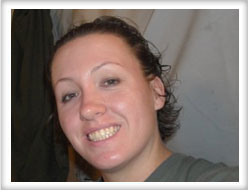
Layla Mansberger served in the US Army/Reserves from 2002-2011. She deployed to Iraq in November of 2008 to Tallia Air Force Base where she worked as a food service specialist. During her time is Iraq, Layla was sexually assaulted and left to pick up the pieces of her emotional stability after suffering military sexual trauma. She returned home in September 2009. Having been injured in Iraq, she came back to the United States in a warrior transition unit.
As Layla describes, "This time on active duty ... I had my ups and downs trying to stay a soldier while trying to deal with the PTSD and physical pain. It seemed like no one cared what really happen to me. It wasn't until I was introduced to several other women vets that have suffered MST that I was finally attended to in any fashion. I was medically retired in Oct 2011."
Layla came to our film through social networking. She and BriGette McCoy were in touch with each other through the internet, and while BriGette was in D.C. with the film makers, we all met for the first time and filmed BriGette and Layla when they met for the first time outside of cyberspace. Layla is the only soldier in the film that we met while on active duty and we are still following - through our Facebook groups and her ongoing transition to civilian life.